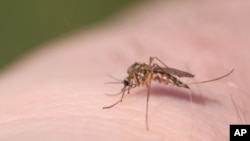The dengue virus is spread through the bite of an infected female Aedes egypti mosquito. The disease causes flu-like symptoms, including high fever, muscle aches and sometimes death. Each year, the disease strikes between 50 and 100 million people living in tropical and subtropical regions.
There are no effective treatments for dengue, so public health experts focus on prevention to keep the disease under control.
That's what researchers at the University of California Irvine and the British biotech company, Oxitec, have done by creating a new breed of mosquito. "We put a gene in, that in the next generation, females won't be able to fly," explains UC-Irvine biologist Anthony James. "So when a wild type female mates with a [genetically altered] male, all of her daughters are incapable of flying."
Since the female mosquito is the one that spreads the disease, creating female mosquitoes that can't fly is key to controlling dengue. "It's only the females that feed on blood and transmit disease, so the males are not part of the transmission dynamics," James says. "So if you can reduce the number of females, ultimately the population crashes and you don't have dengue transmission anymore."
A safer alternative
James says using this new breed of mosquito could be a more benign and, perhaps, more effective alternative to spraying insecticides, a commonly-used strategy to control dengue. "Insecticides require people to be able to find where the mosquitoes are. It requires care in their use because insecticides have off-target effects." And, he adds, they are more costly since they require more personnel and materials.
This "no-fly" strategy is still in the testing stage. James and his colleagues are now planning what they call cage tests, where the genetically-modified mosquitoes are placed in huge outdoor cages and their effectiveness in stopping transmission of dengue is assessed.
Within a year, James hopes he can begin testing the strategy in places where dengue is prevalent.
The research is published in the "Proceedings of the National Academy of Sciences."




